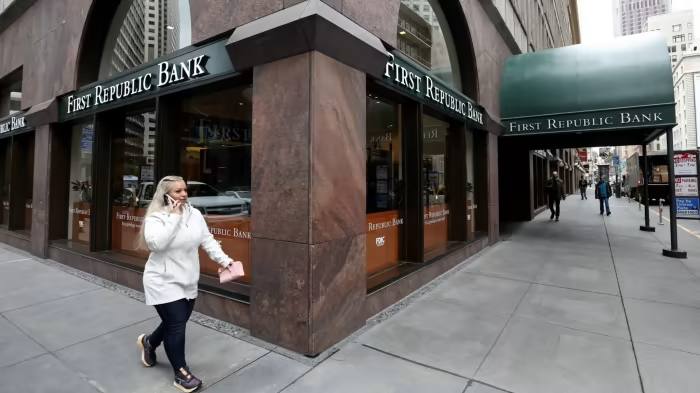
Good morning. This article is an on-site version of our FirstFT newsletter. Sign up to our Asia, Europe/Africa or Americas edition to get it sent straight to your inbox every weekday morning
Happy St Patrick’s Day. Struggling banks on both sides of the Atlantic are unlikely to be in a festive mood as they continue to dominate the headlines.
California-based lender First Republic is the latest bank to be rescued following the collapse of Silicon Valley Bank a week ago. We bring you all the details and we also have a report on how the “three Js” stitched together a package of measures to shore up confidence in the US financial system.
Here’s what I’m keeping tabs on today:
-
Economic data: The OECD publishes its interim outlook on the global economy, while the University of Michigan releases the preliminary March reading of its consumer sentiment index. There is also data on February industrial production.
-
Elizabeth Holmes: The Theranos founder will ask a judge to pause her prison sentence of more than 11 years while she urges an appeals court to review her conviction.
-
St Patrick’s Day celebrations: Senior figures from Ireland’s main political parties will attend the annual White House reception.
Have a great weekend, and thank you for reading FirstFT.
Today’s top news
1. The largest US banks are depositing $30bn into First Republic Bank in an attempt to bolster its finances and contain the fallout from the collapse of Silicon Valley Bank. Here are the financial institutions involved in the deal.
-
The ‘three Js’: US Treasury secretary Janet Yellen, JPMorgan chief Jamie Dimon and Federal Reserve chair Jay Powell put together the rescue deal over multiple calls.
2. EXCLUSIVE: Carl Icahn has urged the Fed to keep fighting “the disease of inflation” ahead of its rate-setting meeting next week, despite SVB and other banking failures. Read the whole of the activist investor’s interview with the FT.
-
Opinion: SVB shows why we should worry about “cool” banks that forget the dull but important job of risk management, writes Anne-Sylvaine Chassany.
3. China’s president Xi Jinping is to travel to Moscow on Monday for talks with Russian president Vladimir Putin, China’s foreign ministry confirmed earlier today. The announcement comes a day after Poland became the first western nation to pledge combat aircraft to bolster Ukraine’s war effort.
4. The US Department of Justice is probing ByteDance’s surveillance of American journalists via TikTok, according to a person familiar with the matter. The investigation comes as western governments crack down on the use of the video platform on official devices.
5. Emmanuel Macron’s unpopular pension reforms failed a critical parliamentary test yesterday, prompting demonstrators to take to the streets in Paris and other cities around France.
How well did you keep up with the news this week? Take our quiz.
News in-depth

A $54bn lifeline for Credit Suisse has failed to halt the questions about the Swiss bank’s future. For investors, it is the bank’s unprofitable business model rather than its liquidity that is the fundamental problem. What comes next? The options on the table range from spinning off its Swiss unit to dissolving the bank.
We’re also reading . . .
-
Musk’s Twitter: Interviews with current and former Twitter staff inform this account of Elon Musk’s ongoing efforts to wrestle the social media platform’s finances under control.
-
Argentina: Look beyond the short-term difficulties of hyper inflation and the potential for economic collapse and some tantalising opportunities lie ahead, writes the FT’s Latin America Editor.
-
Iran politics: Former crown prince Reza Pahlavi, the exiled son of Iran’s last shah, has emerged as a figurehead for those who think regime change is near.
Chart of the day
The English have a saying, “an Englishman’s home is his castle”. Americans dream of a detached property surrounded by a white picket fence, while Australians and New Zealanders aspire to a “quarter acre”. Anglophone countries have a centuries-old aversion to apartment living. This gives rise to housing shortages and environmental degradation, argues John Burn-Murdoch.

Take a break from the news
On his final day as the FT’s Weekend Editor, Alec Russell reflects on the political power of poetry with Booker-winning novelist and poet Ben Okri in the weekend podcast. We also meet one of London’s most notorious and prolific graffiti writers.
Additional contributions by Tee Zhuo and Emily Goldberg
Thank you for reading and remember you can add FirstFT to myFT. You can also elect to receive a FirstFT push notification every morning on the app. Send your recommendations and feedback to firstft@ft.com






